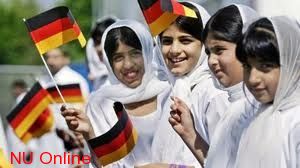Munich, NU Online
Islamic classes have been started at different schools in Germany since the start of the academic year but in the beginning, Islamic religious curriculum is being offered at selected schools only. Lack of professional Islamic teachers in the country is not allowing satisfactory number of students to attend the Islamic classes.<>
Huseyin Cetin teaches Islamic religious instruction in Marxloh, a heavily Muslim section of Duisburg in the Ruhr Valley industrial region of Germany. North Rhine-Westphalia (NRW), where Duisburg is located, is the first state in Germany to offer Islamic religious instruction. But the introduction of the classes has been bumpy. There are 100,000 Muslim elementary school children in NRW, but there are only enough teachers to instruct 2,000 pupils.
The problem was expected. It will take some time to provide blanket coverage across the state, admits Sylvia Löhrmann, the NRW education minister.
“But what is the alternative? We could not have trained the teachers before knowing whether we were going to have the classes in the first place,” she said, adding that there first had to be the legal foundation, which meant introducing the classes incrementally.
Moreover, courses to train Islam teachers at German universities have only just begun. The first graduates from the University of Münster won’t be ready until the spring of 2017.
Huseyin Cetin teaches second graders in Marxloh, as one of 40 qualified Islam religious instruction teachers in NRW. He studied theology and earned an education degree from Uludag University in Turkey. He has been working as an Islam teacher in a variety of pilot projects since 1999.
Cetin said, “Prior knowledge of Islam varies widely among the school children depending on how often they attend classes at their local mosque. How much they already know also depends on what country they, or their parents, come from.”
“Our job is to harmonize these different levels of knowledge and to correct the wrong information they have,” he added.
To address the shortage of teachers, the NRW education ministry is offering special courses where young educators can earn a certificate to teach Islamic religious instruction.
“On the one hand, career changers – that is, Muslims who were enrolled in Islamic studies programs – are being trained to teach religion classes; but, more importantly, the other group is Muslim teachers who have been teaching something else,” says Mouhanad Khorchide, from the University of Münster.
“One of the bigger problems, however, is the lack of appropriate teaching materials,” said one career changer, Aziz Fooladvand, who teaches in Bonn.
“There is a book for the five and sixth grades, but there is simply no material for higher levels. I select the topics for all the grades myself, but that takes a lot of time and effort. For the upper grades there is also no harmonized syllabus as yet,” he added.
Despite the modest number of pupils participating at the moment, Khorchide is optimistic about the prospects. He said that there is a brisk interest in religious education among the students and, in Muslim circles; the Islamic courses have been widely accepted. “This is seen as a sign of recognition for Islam and Muslims as equal citizens in this country,” he said.
Editor: Sudarto Murtaufiq
Terkait
Terpopuler
1
Disambut Ketum PBNU, Presiden Prabowo Hadiri Mujahadah Kubro Harlah 100 Tahun NU di Malang
2
Resmi Dikukuhkan, Ini Susunan Pengurus MUI Masa Khidmah 2025-2030
3
1.686 Warga Padasari Tegal Mengungsi, Tanah Bergerak di Tegal Masih Aktif
4
Ratusan Ribu Warga Dikabarkan Bakal Hadiri Mujahadah Kubro 100 Tahun NU di Malang
5
Pemerintah Nonaktifkan 13,5 Juta Peserta PBI JKN, Mensos Gus Ipul: Dialihkan ke Warga Lebih Miskin
6
Ansor University Jatim Buka Pendaftaran Ramadhan Academy, Tiga Kelas Intensif Gratis
Terkini
Lihat Semua



